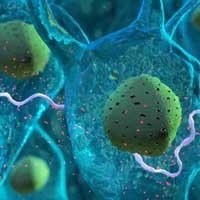Lyme Disease and Complications - The Hidden Public Health Problem You Need To Know

The misconception and vast misdiagnosis of tick borne illness such as Lyme disease may in-fact be leading to many patients unnecessarily suffering of chronic health conditions such as fibromyalgia, chronic fatigue and autoimmune diseases. These conditions curiously share many of the same clinical symptoms seen with Lyme disease and other coinfectious agents. In this article we will explain some of the major reasons and issues surrounding misdiagnosis of patients. The correct diagnosis and treatment of many of these cases may in-fact help a patient get well without a lifetime of medications and suffering.
As more light is shed on Lyme disease, we are learning just how threatening this illness is. A new report from the Center for Disease Control pins as many as 300,000 new Lyme disease cases are reported each year, which is an astonishing ten times more than previously thought. It's just mounting evidence that Lyme disease is one of the nation's fastest growing medical problems. “This new preliminary estimate confirms that Lyme disease is a tremendous public health problem in the United States, and clearly highlights the urgent need for prevention,” according to Dr. Paul Mead, chief of epidemiology and surveillance for CDC's Lyme disease program, based in Ft Collins, Colo. [1]
It's even more frightening when you consider that Lyme disease is the second fastest growing infection worldwide after HIV. Part of the reason why Lyme disease is misdiagnosed comes from a number of misconceptions. Some people think the tick-borne disease is isolated to New England, but it's actually spread throughout the United States, Canada and The UK. In California alone, Lyme is underreported by as much as 50%. [2]
Another misconception is that chronic Lyme disease complex does not exist. It's not even recognized by the CDC and other health organizations. They believe that Lyme can be treated with a routine regimen of oral or (rarely) IV antibiotics, but ask any patient who has been treated for Lyme and still has symptoms and they'll confirm the disease exists and can linger. Medscape describes CLDC as post-Lyme disease syndrome and report approximately 80% of untreated or inadequately treated patients develop some manifetation of this disseminated disease. [3]
Many conventional doctors will argue patients claiming to have chronic Lyme disease really have something else, such as fibromyalgia, chronic fatigue or another autoimmune disease. This is because Lyme affects the nervous and endocrine systems, mimicking over 350 different diseases, many of which have an idiopathic or “unknown” origin.
This begs the question: which is easier, exclusively prescribing pain medications, antidepressant, sleep aids and steroids that manage symptoms or does it not make sense to test for in-depth infections, removing them if present and then seeing if symptoms clear?
Most of these chronic disease like fibromyalgia, autoimmune disease and chronic fatigue syndrome have multiple infections that may include complications of chemical toxins and heavy metal poisoning but their doctors are simply giving out medications for the pain, depression and sleep disturbances. We feel strongly that this can be turned around for many patients, as we've been doing so for over a decade.
It's known that the spirochete bacteria, known as Borrelia burgdorferi, can burrow into the nervous system and remain dormant, sometimes for years. Lyme disease also brings in many coinfections (such as HHV6, EBV, CMV and candida) and can activate other infections due to an immune compromised state that a patient can develop from untreated chronic infections. With ever increasing prominence, now is the time to treat Lyme disease and other tick-borne illnesses like the severe threat that it is. How do you do that? By finding doctors that are equipped and educated about Lyme and go about treating it using the best available medicine available, as well as becoming familiar with tick-borne illnesses and zoonotic infections as a whole. It's also important to weigh other complicating factors, such as the toxic environments that we live in today. What does that model look like? Let's learn more.
What Makes Lyme Disease So Frightening?
To make this easier to understand, let's define Chronic Lyme Disease Complex (CLDC), based on our ten years of clinical experience and our Lyme literate medical doctors' experience with treating chronic infections, fibromyalgia and autoimmune diseases. Envita defines CLDC as involving one or more factors: Lyme disease; its coinfections; the reactivation of dormant infections, such as viruses; and an immune compromised state that can be further complicated by heavy metal and chemical toxicities. How this differs from the CDC's definition is, they are treating Lyme disease in a vacuum as one infection and not clinically correlating it to the complete complex diagnosis that is typically seen in patients. That make sense, as the CDC is focused on epidemiology and doctors see much more than some classic text book presentation.
First, let's talk about those coinfections. Lyme disease is commonly spread by deer ticks and each poppyseed-sized bugger carries at least four other pathogens. This can include Babesia, anaplasmosis, Epstein Barr, cytomegalovirus, herpes virus 6 and other infections. In fact, Lyme disease can imitate more than 350 diseases.
This problem gets even worse if you get tested for Lyme, but none of these other infections are addressed.Furthermore, there is a strong link between tick-borne illness, chronic Lyme disease complex and fibromyalgia, chronic fatigue and other autoimmune diseases that are said to have no known causes.
But infectious diseases such as Lyme, HHV6, EBV and CMV can also cause or contribute to other autoimmune diseases, such as chronic fatigue syndrome, ehrlichiosis, Chlamydia pneumonia, candida infections and other coinfections that travel alongside this disease. How you go about treatment requires a complete testing profile and much more than just a dose of antibiotics. These infections can also act as triggers that bring about epigenetic shifts that may cause cancers as bacterial and viral infections are being more and more connected to various cancers.
For the first time in recent history, this generation will not live as long as the previous generation. If they do, their lives will likely be managed with harmful medications, leading to a lifetime of poor quality of living. There is no doubt that many of the factors discussed in this article will play a role in this unfortunate scenario, which is why we believe in a more complete healthcare regimen is needed and needed now.
This comes down to a singular question: do you want to take medication that will only mask and manage symptoms or do you want to really treat the underlying cause to your disease? Staying on medications and dealing with their complicationfor lifetime never allows people to achieve and maintain optimal health.
How To Test and Treat Chronic Lyme Disease Complex
There are many tests for Lyme disease. There's ELISA, IgG, IgM and Western blot, but the best test is probably dark-field microscopy test with silver nitrate stain. You can read more about the pros and cons of these different tests here, but suffice it to say you need to find a doctor, better yet an entire medical team, that really understands these different tests, correlation to key symptom picture and has the treatments and techniques to help you get well. Our group not only understands it, but have been doing it for over a decade with plenty of experience and success for our patients.
Doctors who are specially trained to treat Lyme are known as Lyme literate medical doctors (LLMD's). That means they've been treating Lyme for many years and are up-to-date on the latest in Lyme disease information. This is not a credential earned by attending a few seminars but a lifetime of helping patients and clinically learning what actually works.
At Envita, we have over 13 years of clinical experience treating Lyme disease and its coinfections using advanced, integrative medicine. Our treatments go beyond just the symptoms, gathering a complete, personalized profile for each patient. If you have any questions about Lyme disease and chronic diseases testing and treatment options please contact us we happy to help. We believe it's time that patients have the options to be set free from chronic disease and have an opportunity to achieve optimal health.
To learn more about how our healthcare program can bring you to optimal health, contact us today.























